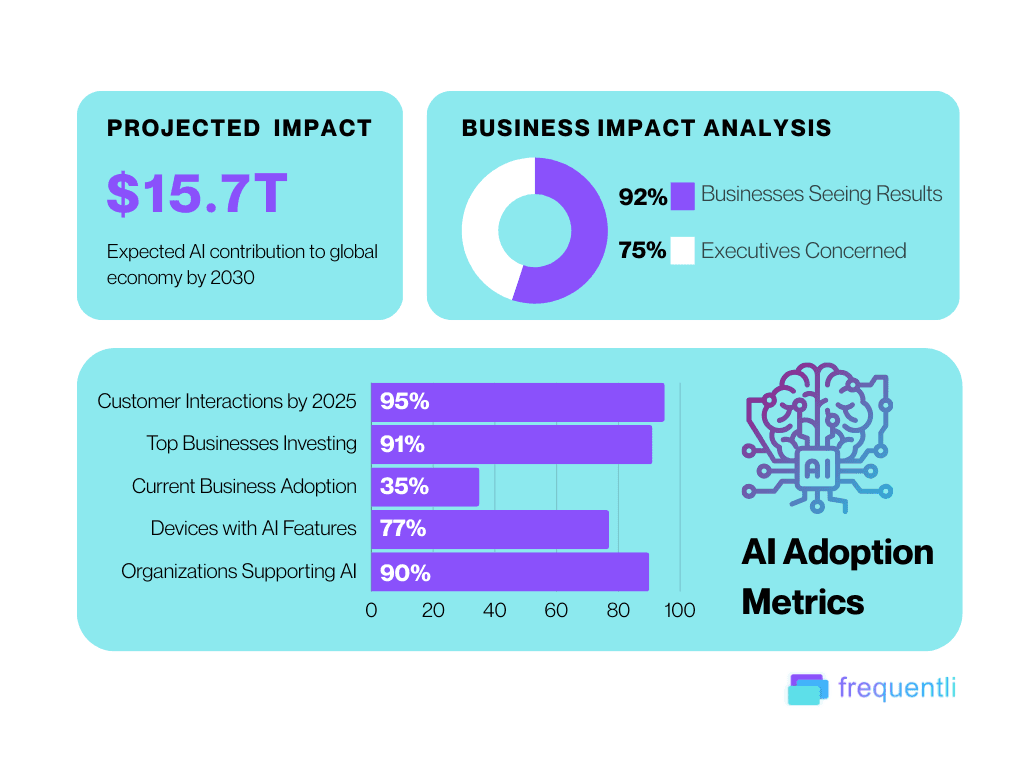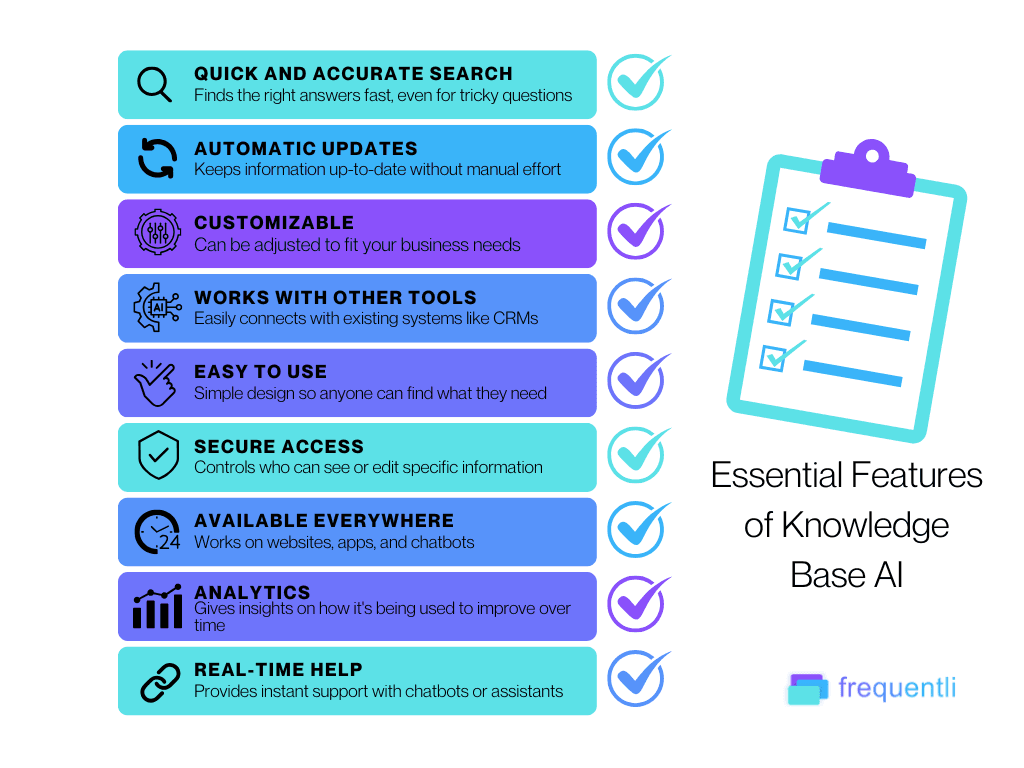What is Knowledge Base AI?
Have you ever tried to find an answer, but the information was all over the place, like searching for a needle in a haystack? That’s a problem companies face, too—mainly as they deal with tons of information every day.
This is where Knowledge Base AI becomes the answer.
Knowledge Base AI is artificial intelligence that organizes, manages, and retrieves information from a company's knowledge resources. It helps businesses quickly access insights and answers by making complex information easy to find and understand.
Unsurprisingly, 83% of companies now prioritize AI advancements in their strategies. AI-powered tools like knowledge bases save time and help businesses work smarter, make better decisions, and improve customer experiences.
This guide explains everything you need to know, from the types and benefits of Knowledge Base AI to real-world examples and must-have features.
You’ll see why Knowledge Base AI is a business game-changer by the end!
Types of Knowledge Base AI
Knowledge Base AI comes in several types, each designed to solve specific problems and make information easier to access.
Here’s a clear breakdown:
Static Knowledge Base AI
This type stores a fixed information collection, such as FAQs, articles, and guides. While the content doesn’t change automatically, AI makes searching it faster and more accurate. It’s ideal for organizations with a stable set of knowledge to share.
Dynamic Knowledge Base AI
Unlike static systems, dynamic AI constantly updates itself by pulling new information from documents, conversations, or user feedback. It ensures the knowledge base stays current and relevant without constant manual updates.
Interactive Knowledge Base AI
This AI creates a conversational experience. Users can interact with it through chatbots or virtual assistants that provide real-time answers, guide them step-by-step, and even troubleshoot problems. It’s perfect for customer support or onboarding new employees.
Customizable Knowledge Base AI
Businesses can train this AI to their specific needs by providing unique data like product details, policies, or industry knowledge. This customization ensures that the AI delivers highly relevant and precise answers for their particular use case.
Also read: How to Choose the Best Knowledge Base Management Software
Benefits of Using an AI-Powered Knowledge Base
AI-powered knowledge bases are becoming essential tools for businesses aiming to improve efficiency and customer service.

AI Adoption metrics
The image above highlights the projected economic and business impacts of AI adoption. It estimates a $15.7 trillion contribution to the global economy by 2030 and provides insights into AI adoption metrics.
Here are some key facts and statistics showcasing their impact:
Boosting Customer Experience
According to the Zendesk Customer Experience Trends Report 2024, 75% of customer experience leaders see AI as a tool that enhances human intelligence rather than replacing it. This highlights AI’s ability to improve service quality effectively.Improving Self-Service Efficiency
Businesses using AI-powered knowledge bases report a 30% drop in support ticket volume. It helps customers resolve common issues independently; companies can free up support teams to focus on more complex problems.Faster Response Times
Companies with AI knowledge bases average a 50% faster response time to customer inquiries.Cost Savings
AI-driven knowledge systems reduce operational costs by up to 40% by streamlining processes, reducing the need for significant support teams, and automating updates.Automated Content Updates
AI systems automatically update knowledge base content based on user activity and new trends. This ensures that information stays current without requiring manual effort, reduces the workload for content teams, and improves reliability.Increased User Engagement
Organizations report a 20% rise in user engagement with AI-powered self-service tools. Natural language processing makes it easier for users to find what they need than traditional keyword searches.Efficient Training and Onboarding
AI-powered knowledge bases can cut employee training and onboarding time by up to 60%. Instant access to comprehensive resources accelerates learning and helps new hires become more productive.
Examples of a Knowledge Base in AI
Here are some real-world examples that demonstrate their impact:
Global Development Bank
Solved knowledge transfer challenges with AI-powered systems, ensuring expertise was retained and accessible.U.S. Insurance Company
Redesigned its knowledge base with AI, improving call resolution rates from 30% to nearly 80%.E-Commerce Platform
Reduced response times by 50%, leading to higher customer satisfaction.Telecom Provider
Automated routine customer queries, allowing agents to handle 30% more complex issues daily.Pharmaceutical Company
A pharmaceutical company struggling to see returns on its digital transformation introduced an AI-powered tagging and organization system. This resulted in significant ROI within six months.Big Box Retailer
Developed an AI system to generate employee documents, reducing errors and simplifying tasks.
Features You Should Look for in a Knowledge Base AI

Say goodbye to outdated, clunky systems. These are the essential features to consider when choosing a Knowledge Base AI platform.
You should always look for features that help you find answers quickly, update information automatically, and work smoothly with the tools you already use. It's should be customizable to your needs and most of all, secure
Backed by innovation, Frequentli.ai ensures your organization stays ahead in knowledge management.
Elevate productivity, enhance customer satisfaction, and stay ahead of the competition with a Knowledge Base AI built for success!
FAQs
How can an AI chatbot with a custom knowledge base be trained using ChatGPT API?
Organize your data, create clear prompts, and use the ChatCompletion.create a method to test and refine the chatbot’s responses.
Why do we use knowledge-based AI?
Stores and organizes information, enabling fast, accurate answers that improve efficiency and decision-making.
What is a knowledge base in AI, and why is it required?
It’s a structured collection of information that AI uses to solve problems and answer questions, ensuring consistent and efficient responses.
Related Read:
Chatbot vs. Knowledge Base: What is best for Customer Support?
Help Desk vs. Knowledge Base: Comparing Key Differences
5 Questions to Ask Before Investing in AI Customer Support Tools
